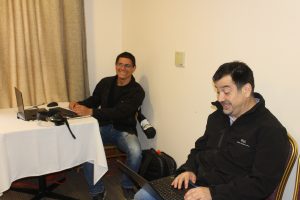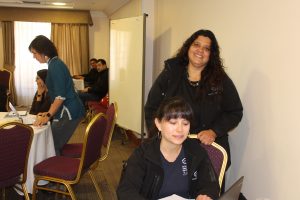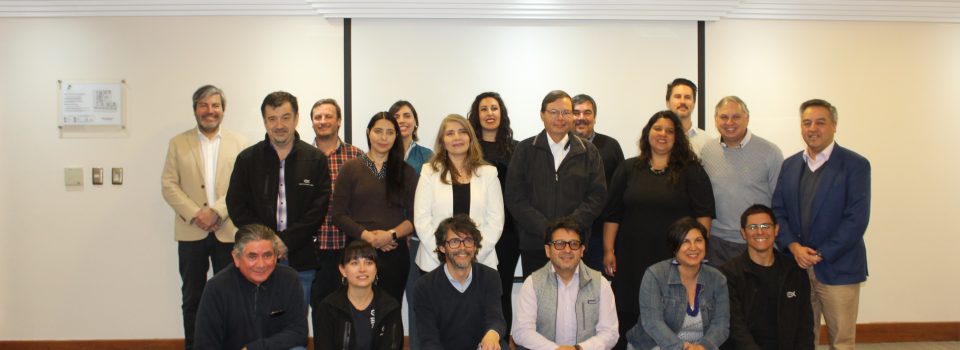Workshop to raise perceptions on Ecosystemic Approach implementation’s associated gaps for Benthic Resources Management and Exploitation Areas regime decision making
December 18th, 2023 The workshop holding was framed in a technical advisory service from IFOP to “Strengthening management and governance for the conservation and sustainable use of biodiversity of global importance in coastal marine ecosystems in Chile ”GCP/CHI/043/GFF project, which consists of Ecosystemic Approach piloting in two management areas (as studies case). Although General Fisheries and Aquaculture Law defines ecosystemic approach, this workshop focused on its international definition, considering FAO’s recommendations made in 2016 to the law. In this context, ecosystemic approach, applied to marine-coastal environment, is a strategy that promotes integrated management of all existing resources in this environment, seeking their sustainable use, in a fair and equitable manner. It is a management approach that integrates ecological, economic, sociocultural and institutional components. Being thus considered as a management instrument under a holistic approach, focused on decision-making processes that balance ecological well-being with human and social well-being, within improved governance frameworks. That is, it is a practical way to achieve sustainable development.
The workshop holding was framed in a technical advisory service from IFOP to “Strengthening management and governance for the conservation and sustainable use of biodiversity of global importance in coastal marine ecosystems in Chile ”GCP/CHI/043/GFF project, which consists of Ecosystemic Approach piloting in two management areas (as studies case). Although General Fisheries and Aquaculture Law defines ecosystemic approach, this workshop focused on its international definition, considering FAO’s recommendations made in 2016 to the law. In this context, ecosystemic approach, applied to marine-coastal environment, is a strategy that promotes integrated management of all existing resources in this environment, seeking their sustainable use, in a fair and equitable manner. It is a management approach that integrates ecological, economic, sociocultural and institutional components. Being thus considered as a management instrument under a holistic approach, focused on decision-making processes that balance ecological well-being with human and social well-being, within improved governance frameworks. That is, it is a practical way to achieve sustainable development.
 This workshop was aimed mainly at public institution actors who in one way or another are related to management areas management. In this workshop, progress was made in identifying gaps for ecosystemic approach implementation, as well as possible actions to take to overcome these gaps and get closer to this approach’s implementation in Chile’s coastal ecosystemic governance.
This workshop was aimed mainly at public institution actors who in one way or another are related to management areas management. In this workshop, progress was made in identifying gaps for ecosystemic approach implementation, as well as possible actions to take to overcome these gaps and get closer to this approach’s implementation in Chile’s coastal ecosystemic governance.
As part of this workshop results, gaps were identified at two levels for ecosystemic approach implementation: first at national and institutional level and then particularly at management areas level. In general, progress is recognized regarding ecosystemic approach principles incorporation, but it has been mainly led by personal actions or groups of people.
The researcher Pedro Romero highlights that the conversation held in the workshop allows us to observe a series of difficulties in concepts internalization such as socio-ecological paradigm and management model based on an ecosystemic approach, considering that any advance in terms of data collection information comprehensively meets focus, which is far from reality. Much of the dysfunction originates because there is no program or public policy that allows efforts of different public agents to be aligned towards a common objective, which causes each institution and department to look after its own interests, making actions aimed at integration of visions are associated with individual efforts of the professionals on duty.
IFOP fisheries division head, Dr. Carlos Montenegro, highlighted this type of projects’s importance, which allow bridging gaps, not only in understanding of all actors regarding ecosystemic approach in fisheries, but also allow share visions regarding concrete actions that can be implemented to realize a desire shared by all sectors, which is sustainable development ans its all associated socio-ecological systems components sustainability with hydrobiological resources extraction activities in our coasts.
By her side, Manuela Erazo, FAO’s implemented Coastal Marine Governance project’s national coordinator, added that “these meetings are essential not only to identify integrated and sustainable management in Benthic Resource Management Areas opportunities, but also to develop and “strengthen, among relevant actors, a vision of this sector’s long-term development, in which prevails a marine resources protection seal, as well as its inhabitants productive activities.”
Likewise, Erazo added, “this exercise is another example that different local actors participation strengthens instances that promote good governance, our project’s general objective,” he concluded.
Finally, researcher Dr. Bryan Bularz highlighted as a workshop general conclusion, the importance of understanding that change towards ecosystemic approach is a process, where each advance, no matter how small, is a step closer to achieving the goal. However, it is necessary to have a program that defines clear objectives to advance at the institutional level (within and between institutions), and at the country level towards management with an ecosystemic approach to fishing.
